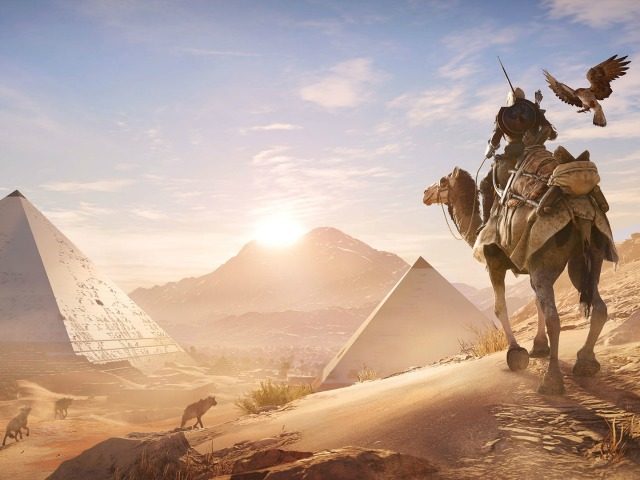After taking a year to reorient a franchise on the verge of exhaustion, Ubisoft dons the iconic hood once more with Assassin’s Creed Origins.
I am genuinely unsure of whether the year’s respite has been good for the Assassin’s Creed franchise. Given time with a playable slice at this year’s E3, I was struck by two things. First, that the franchise felt largely unchanged in ways I had hoped to see it evolve. Second, the ways Origins has changed have pushed it toward the sort of Ubisoft open-world homogenization that has been creeping into all of their major franchises.
The setting for Origins, at least, is unique. Ancient Egypt isn’t exactly well-worn territory for video games, and it’s rendered in vivid, authentic detail here. Not since Ezio’s Italy campaing has the world felt so distinct, its sense of adventure so immediate. If the franchise’s sabbatical has provided anything, it’s that it has been time for Ubisoft’s artists to develop a truly transportive sense of environment. Much of this is due to the NPCs on display, both human and animal. They move and behave with more life than we’ve ever seen from the urban sprawl in any previous setting, due primarily to the fact that they have been gifted with substantive artificial intelligence for the first time.
Rather than animated mannequins, the denizens of Assassin’s Creed Origins’ Egypt have their own routines, priorities, and interactions. It makes little difference to anyone running breakneck through the world, but for the determined explorer — and I am most certainly one — it breathes life into otherwise thoughtless navigation. We weren’t able to see very much of that in our time-restricted demo, and many of the more interesting interactions on display smelled of pre-scripted events, but the possibilities give me hope for the wider game world.
Unfortunately, the classic Assassin’s Creed fantasy seems to have been thrown aside in favor — of all things — crafting. That Ubisoft gameplay time-sink staple from other series has been brought from afterthought to center stage to support the more RPG-like loot aspects of Origins. And while the prospect of a custom loadout seems like it would be a great fit for a game about building the perfect assassin, in practice, it looks a lot like more like Far Cry‘s oft-derided exercise in animal looting.
Similarly, a drone-equivalent hawk companion has been cribbed from Watch Dogs, complete with a UI that looks more like it was pulled from Transformers than the Nile. It’s crucial to the same enemy marking system that we’ve seen in both of the aforementioned franchises. Here, social media information has been replaced with levels and behaviors of NPCs. The information accomplishes two things: it robs the conflicts of any shred of remaining immersion, as floating health bars and level numbers above your foes; and it lets you know when you’ve gotten in over your head.
That’s because your skill in Assassin’s Creed Origins matters much less than your progression. Your deadly grace through gameplay comes in a distant second to your relative level, and even the most mundane guardsman will handily end your life if his world area is leveled higher than you’ve managed. Even driving a hidden blade through the skull of an unsuspecting target will result in little more than annoyance if you haven’t gained enough experience and looted enough hippo hides to make sure your assassin’s blade is… what? Extra sharp?
The Assassin’s Creed series has always done at least one thing right. It makes you feel as if you are a dangerous assassin, with a dozen ways to dispatch horrible deaths at the tips of your fingers. You have always been a hooded revenant, a mysterious entity of both light and dark. Lethality is at the heart of the experience. It is mystifying to me that such an essential piece of the series’ power has been so readily muted.
It isn’t difficult to understand what Assassin’s Creed Origins is trying to do; a massive world filled with errands to run and items to collect makes for games with impressive duration. But if the newly revamped AI and mission design doesn’t do a lot of the heavy lifting, our journey across the sands will be an exercise in painful monotony — and a far cry from the revitalization that Ubisoft is hoping to achieve for the series.
Follow Nate Church @Get2Church on Twitter for the latest news in gaming and technology, and snarky opinions on both.

COMMENTS
Please let us know if you're having issues with commenting.